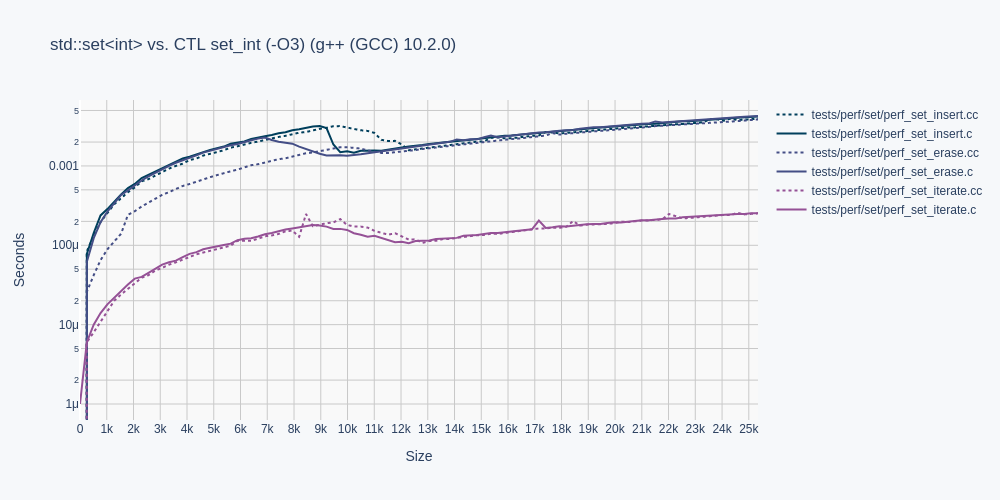CTL is a fast compiling, type safe, header only, template-like library for ISO C11.
CTL aims to improve C11 developer productivity by implementing the following STL containers in ISO C11:
deq.h = std::deque
lst.h = std::list
pqu.h = std::priority_queue
que.h = std::queue
set.h = std::set
stk.h = std::stack
str.h = std::string
vec.h = std::vector
Configure a CTL container with a built-in or typedef type T.
#include <stdio.h>
#define P
#define T int
#include <vec.h>
int compare(int* a, int* b) { return *b < *a; }
int main(void)
{
vec_int a = vec_int_init();
vec_int_push_back(&a, 9);
vec_int_push_back(&a, 1);
vec_int_push_back(&a, 8);
vec_int_push_back(&a, 3);
vec_int_push_back(&a, 4);
vec_int_sort(&a, compare);
foreach(vec_int, &a, it)
printf("%d\n", *it.ref);
vec_int_free(&a);
}Definition P states type T is Plain Old Data (POD).
To compile, include the ctl directory:
gcc main.c -I ctlFor a much more thorough getting started guide, see the wiki: https://github.com/glouw/ctl/wiki
Types with memory ownership require definition P be omitted, and require
function declarations for the C++ equivalent of the destructor and copy constructor,
prior to the inclusion of the container:
typedef struct { ... } type;
void type_free(type*);
type type_copy(type*);
#define T type
#include <vec.h>Forgetting a declaration will print a human-readable error message:
tests/test_c11.c:11:11: error: ‘type_free’ undeclared (first use in this function)
11 | #define T typeCTL performance is presented in solid colors, and STL in dotted colors,
for template type T as type int for all measurements.
Omitted from these performance measurements are que.h, stk.h, and str.h,
as their performance characteristics can be inferred from deq.h, and vec.h,
respectively.
Note, CTL strings do not support short strings.
To run all functional tests, run:
makeTo compile examples, run:
make examplesTo generate performance graphs, run:
sh gen_images.sh
# Graphing requires python3 and the Plotly family of libraries via pip3.To do all of the above in one step, run:
./all.shFor maintaining CTL, a container templated to type int can be
outputted to stdout by running make on the container name, eg:
make deq
make lst
make pqu
make que
make set
make stk
make str
make vecSTL std::map will not be implemented in CTL because maps only provide slight
syntactic improvements over sets.
STL std::unordered_map and std::unordered_set will not be implemented in CTL
because ordered containers are preferred, even at the cost of performance.
STL variants of multi-sets and multi-maps will not be implemented because
similar behaviour can be implemented as an amalgamation of a set and lst.
vec.h: See `realloc`.
deq.h: Paged `realloc`.
lst.h: Doubly linked list.
set.h: Red black tree.
Thank you kully for the Plotly code, and thank you for the general review.
Thank you smlckz for the foreach cleanup.





